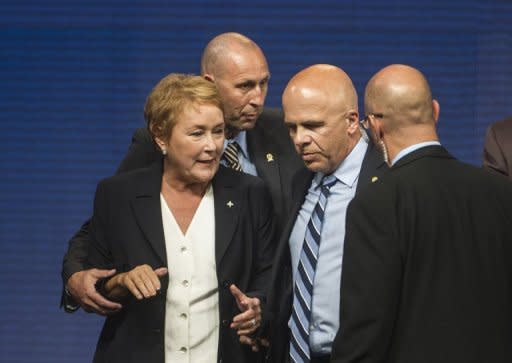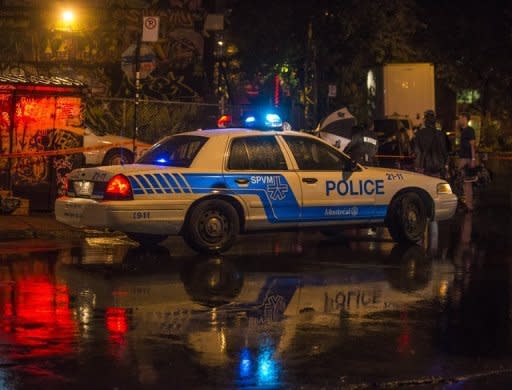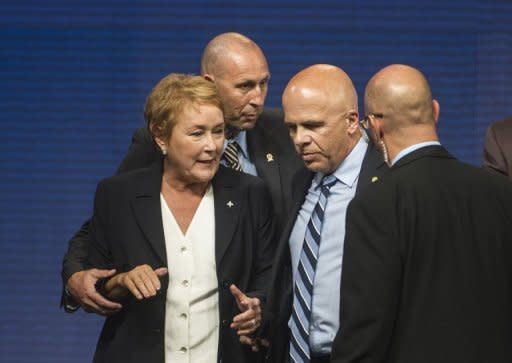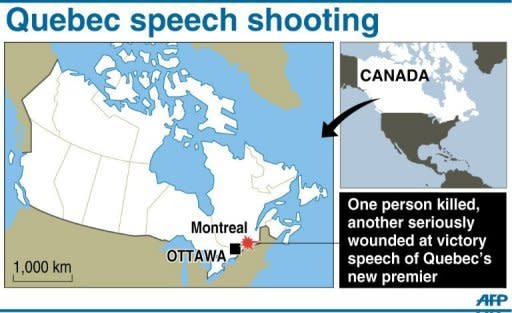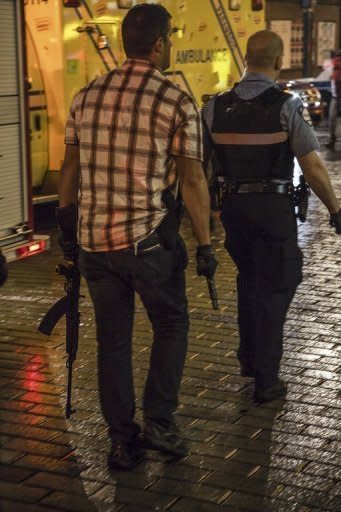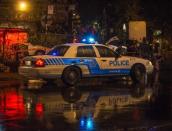Deadly shooting after Quebec separatist victory
Quebec police launched an investigation on Wednesday after a masked gunman dressed in a bathrobe and screaming anti-French slogans opened fire at a separatist victory rally, killing a bystander. The French-speaking Canadian province's new premier elect, Pauline Marois, was hustled off stage by security when the shots rang out, and police quickly immobilized the shooter, who shouted: "The English are waking up!" Spokesmen for the Montreal city and Quebec provincial police said they had not ruled out an assassination attempt on Marois, but said they were still interrogating the suspect, a 62-year-old man from the province. "The Surete du Quebec, being responsible under its mandate for state security, is attempting to establish a motive," spokesman Guy Lapointe said. Montreal police spokesman Ian Lafreniere said two firearms had been found. Television images showed a pistol and a Kalashnikov-style assault rifle, and the arrest of a man dressed in a black balaclava and a blue bathrobe. The attacker opened fire outside a Montreal concert venue as Marois gave a speech inside, celebrating voting projections that gave her French-speaking separatist Parti Quebecois victory in provincial elections. According to Lafreniere, one man was shot dead outside and another wounded. Bystanders pulled the injured victim inside the venue to shield him, whereupon the attacker poured a flammable substance on the door and set it alight. The victims have not been officially identified. The gunman offered no resistance as police closed in and he was quickly disarmed and hand-cuffed. His van was found near the scene and it contained a quantity of the same flammable liquid that he had sprayed on the door. Investigators did not speculate about the shooter's motives, but he could be heard crying out in French "The English are waking up" and later, according to reports, in English: "It's gonna be f(expletive) payback!" There is a history of tension between Quebec's French-speaking majority, some of whom favor splitting from the rest of Canada, and the province's anglophone minority, but in recent years the split has rarely turned violent. Marois' party remains committed to eventual independence, but she comes to power this week thanks to a wave of discontent with nine years of Liberal rule rather than a sudden increase in support for separatism. Observers do not expect the Parti Quebecois to move quickly to organize an independence referendum, but just moments before the shooting Marois had said that "the future of Quebec is to be a sovereign country." The party's victory came after allegations of corruption against leaders of the former Liberal administration, which was federalist, and months of nightly student protests over a planned tuition hike. Canada's federal prime minister, Stephen Harper condemned the shooting. "I was angered and saddened to hear of last night's horrific shooting at the Parti Quebecois event at Metropolis," he said. "It is a tragic day where an exercise of democracy is met with an act of violence." Marois's party will lead a minority government, having secured around 32 percent of the vote, narrowly ahead of the Liberals. Turnout was strong, with nearly six million voters casting ballots for 125 lawmakers, and the separatists were on course to win 54 seats, to the Liberals' 50 and 19 to the middle-ground Coalition Avenir Quebec. Outside polling stations, voters going to cast their ballots said they were eager for a new government but appeared split on secession. A woman in her 40s who came with a placard that read "vote with your heart" said she dreamed of an independent Quebec, "a small country that is easier to govern" and more adept at managing its vast natural resources. Behind her, Therese Boily, a grandmother who immigrated from France, was skeptical. "Independence? I'm not really for that. Usually, things change for the worse," she told AFP. Quebec twice rejected independence in 1980 and 1995, but federalists only narrowly won the last referendum. Marois has said she will only hold a third referendum on independence if a win is assured, which is unlikely to be any time soon, given that barely one in three Quebecers currently supports secession.

